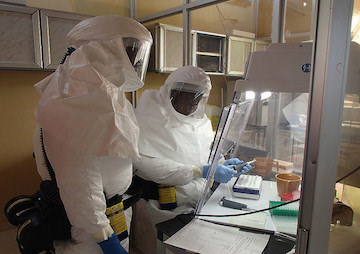Ebola Vaccine Proves 100 Percent Successful in Small Trial
A vaccine to fight the deadly Ebola virus has been shown to be 100 percent successful in a trial conducted in Guinea. Experts say the drug is likely to put an end to the West African epidemic.

A vaccine against the deadly Ebola virus has been shown to be 100 percent successful in a trial conducted in Guinea. Experts say the drug is likely to put an end to the West African epidemic, which has killed an estimated 11,280 people as of Thurdsay, according to World Health Organization data.
Nature reports:
An experimental Ebola vaccine seems to confer total protection against infection in people who are at high risk of contracting the virus, according to the preliminary results of a trial in Guinea that were announced today and published1 in The Lancet. They are the first evidence that a vaccine protects humans from Ebola infection.
“We believe the world is on the verge of an efficacious Ebola vaccine,” Marie-Paule Kieny, the World Health Organization’s assistant director-general for health systems and innovation, said during a press conference in Geneva, Switzerland, today.
The results also have implications for outbreak response in general. “This is illustrating that it is feasible to develop vaccines much faster than we’ve been doing,” says Adrian Hill, a vaccine scientist at the University of Oxford, UK, who is involved in testing a different Ebola vaccine. “We just need to go on and develop them and get on with them before outbreaks appear.”
The Guinea trial — called ‘Ebola, ça suffit’ in French (‘Ebola, that’s enough’) — tested a ring vaccination design, a strategy that was borrowed from successful smallpox eradication efforts in the 1970s. After one patient contracts the disease, their close contacts are vaccinated in the hope of stemming the onward spread of the virus.
The Guinea trial included two arms: one in which adults who had been in contact with someone infected with Ebola and their subsequent contacts were vaccinated shortly after the original patient developed Ebola, and a second in which contacts instead received the vaccine three weeks later2. The trial tested a vaccine called rVSV-ZEBOV, which is composed of an attenuated livestock virus engineered to produce an Ebola protein. The vaccine was developed by the Public Health Agency of Canada and then licensed to the drug companies NewLink Genetics and Merck.
Of the 2,014 people who received the vaccine immediately as part of the first arm, none developed Ebola ten days after getting the vaccine. The 10-day window allows the vaccine to summon an immune response and accounts for any pre-existing Ebola infection. (A few people in the immediate vaccination group, however, did develop the disease between 1 and 10 days after vaccination.) That compares with 16 infections among the 2,380 people in the second arm.
The findings mean that the vaccine provided 100% protection from the virus, though the study’s small size means that the vaccine’s true protection rate may be slightly lower, Kieny says. The authors of the paper put its true effectiveness at between 75% and 100%.
.
–Posted by Roisin Davis
Independent journalism is under threat and overshadowed by heavily funded mainstream media.
You can help level the playing field. Become a member.
Your tax-deductible contribution keeps us digging beneath the headlines to give you thought-provoking, investigative reporting and analysis that unearths what's really happening- without compromise.
Give today to support our courageous, independent journalists.






You need to be a supporter to comment.
There are currently no responses to this article.
Be the first to respond.